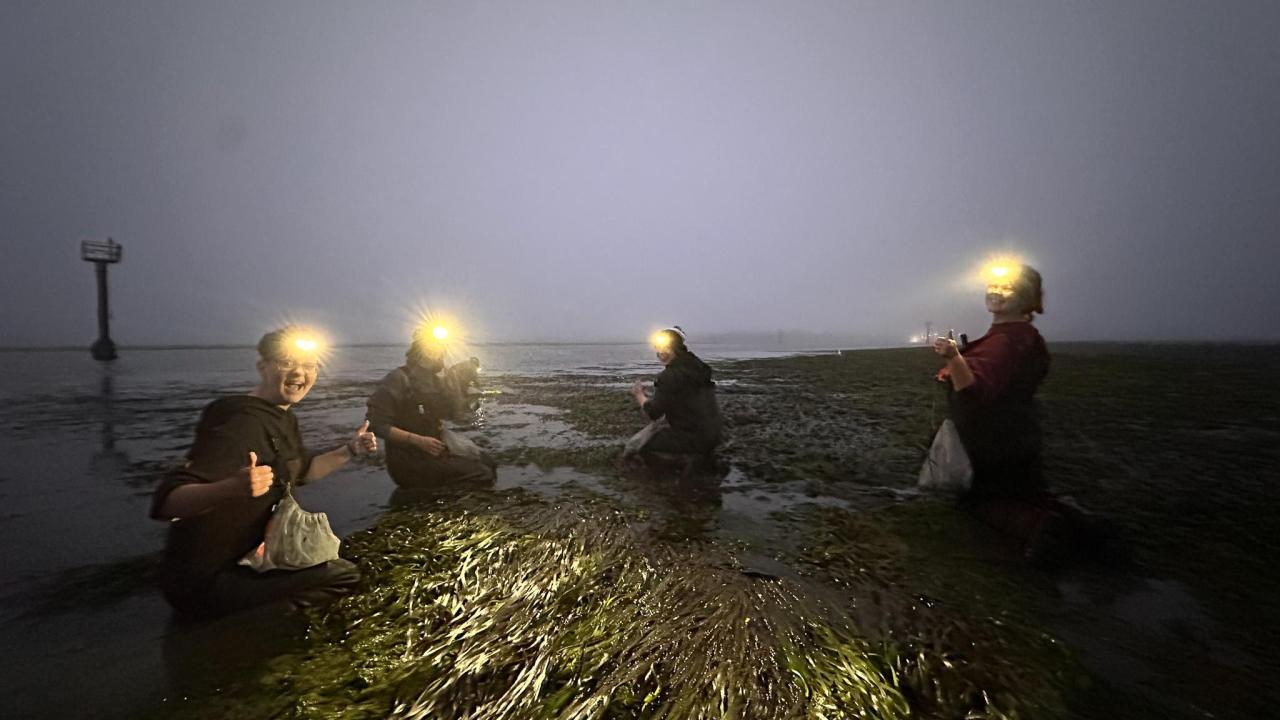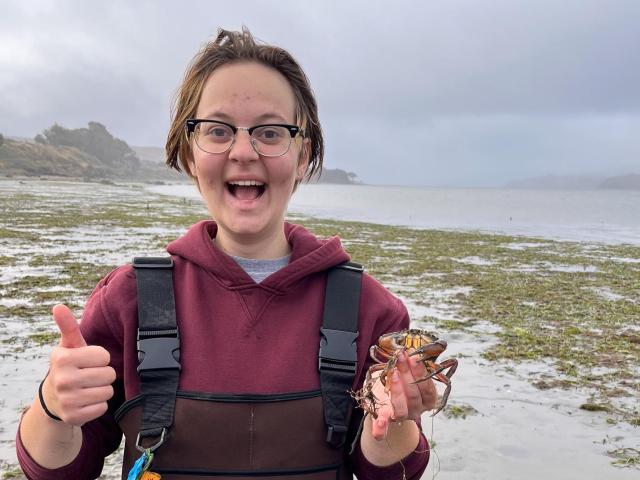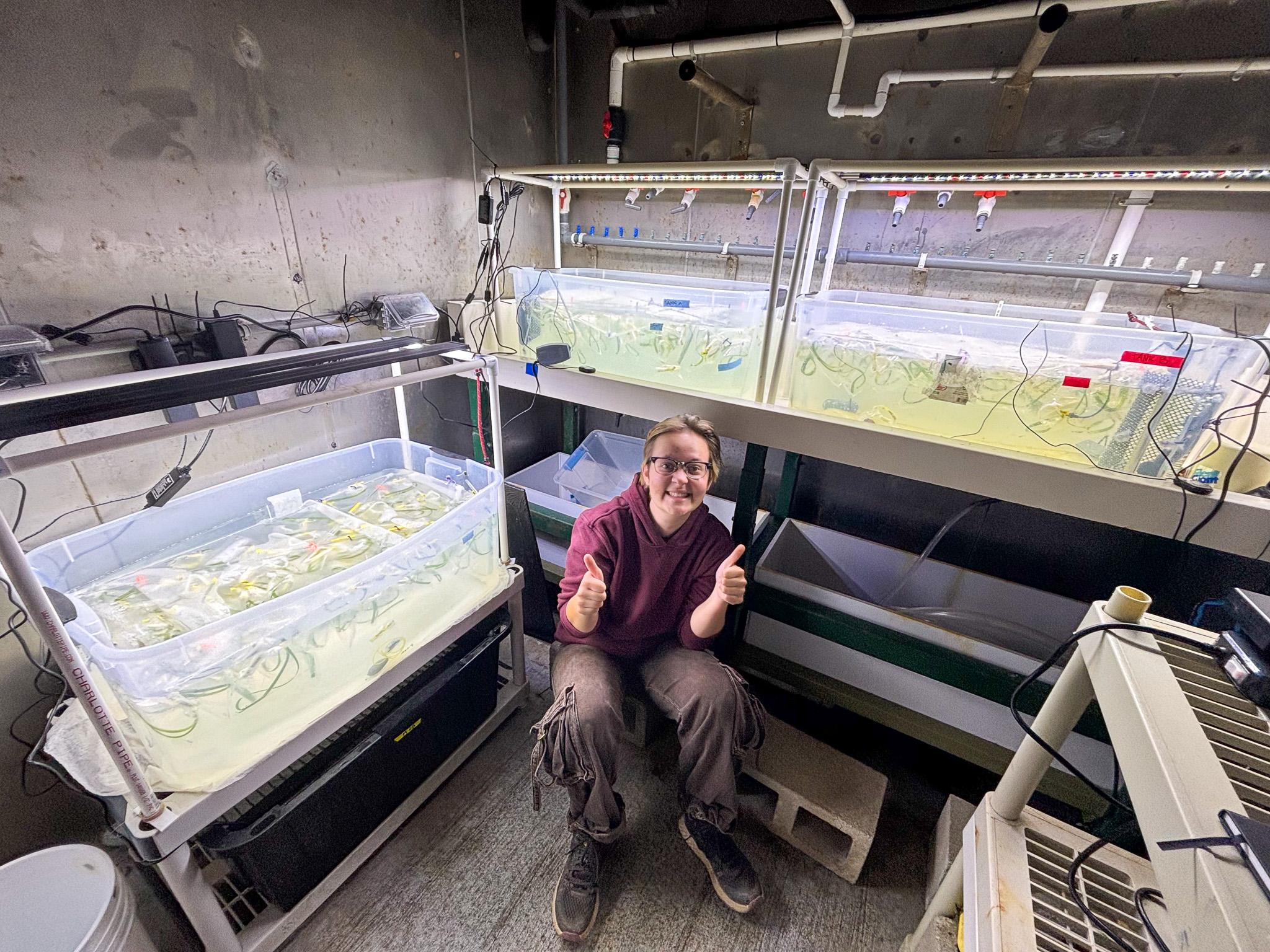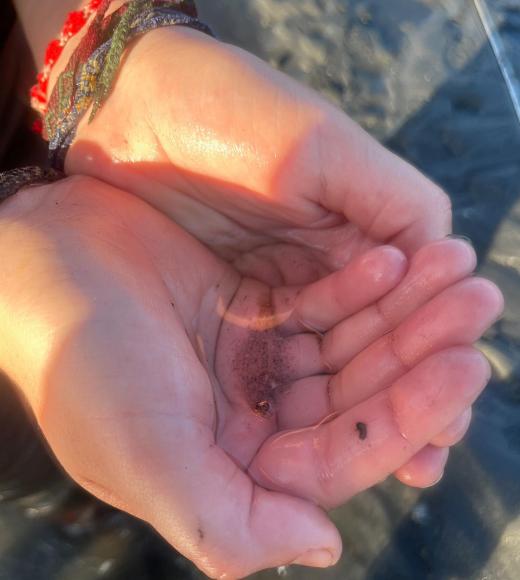
“The Best Job I’ve Ever Had”
An EVE Scholar’s Summer at BML

It’s early—almost too early to be out walking. But Leo Konefat, a rising third-year undergraduate at UC Davis and one of the 2025 EVE Scholars, has an urgent appointment with a low tide. On that first morning, getting up at dawn to reach the field site on time, the fog was low, the stars were overhead, and the foghorn’s low bleat in the distance offered a first glimpse of the coastal world he would be immersed in for the next ten weeks.
The EVE Scholars program, funded by the Department of Evolution and Ecology (EVE), offers paid, full-time summer research opportunities for UC Davis undergraduates from any major. Scholars work under the mentorship of EVE faculty or researchers on the Davis campus or at the Bodega Marine Laboratory (BML) to design and carry out independent research projects—an experience that combines the rigor of scientific training with the thrill of discovery.
For Leo, it was the opportunity he hadn’t realized he was looking for. A microbiology major, he has long been captivated by the microscopic world, keeping pet molds (“they’re adorable!”) and cultivating a fascination with slimeways. He had expected his summer to follow the path of many college students: splitting time between part-time work and volunteering in a research lab. Then, while browsing the UC Davis website, he came across the EVE Scholars program—an almost too-good-to-be-true chance to work on the coast, develop and conduct his own project, and get paid for it.
The “Black Plague” of Eelgrass

Labyrinthula zosterae, the microbe responsible for eelgrass wasting disease, is the focus of Leo’s research project. On a microscope plate, the microbes form delicate clumps and patterns, but on a host, they create inky black lesions that mar the slender blades of eelgrass (Zostera marina) and have even triggered mass die-offs in seagrass meadows along the Pacific coast. Spread through the water, exposure is virtually unavoidable, and there is no treatment once seagrass is infected. What scientists can do is learn how the disease progresses and what factors may help eelgrass resist it.

Leo’s experiment asks whether disease severity depends on water temperature, the particular pathogen isolate (collected from different sites), or the interaction of the two. Since eelgrass populations are locally adapted to their environments, understanding how pathogens from different sites behave across a range of conditions could explain why some eelgrass meadows are more vulnerable than others.
Despite the complexity of the science, the experiment itself unfolds in what Leo jokingly calls a “Home Depot Chic” setup: plastic tubs, zip ties, and aquarium heaters regulating each test group. While the project is still underway, early findings suggest that temperature plays a role in how quickly and severely the disease appears, and contributes to the larger goal of a deeper understanding of how both temperature and pathogen strain shape the progression of eelgrass wasting disease.
Mentorship on the Coast

From the busy, bike-laden streets of Davis to quiet, foggy bluffs overlooking the Pacific, the shift in environment has been dramatic. Whether watching waves through the library windows, spotting deer and quail on the trails, or making a friendship bracelet at sunset, Leo has found a sense of calm in the coastal atmosphere.
The community shift has been just as notable. While EVE Scholars complete independent research projects, they work alongside existing lab groups—in Leo’s case, the Stachowicz Lab and the Brown Lab. With mentorship from Professors Jay Stachowicz and Anya Brown, Postdoctoral Scholar Amy Briggs, and Graduate Student Serina Moheed, he has gained insight into “how many moving parts there are in an experiment, how vigilant you need to be with checks, with what kind of data you’re noting, and all the different intricacies (of a research project).”
For Leo, the experience, with all its moving parts, was a departure from previous research roles focused on a single, isolated task. “It’s really powerful to know that,” he says. “It gives me a good perspective on—if I’m going into research—what to expect and a more realistic picture of that.”
Advice to Future Scholars
Leo’s advice to future applicants is straightforward: be enthusiastic and “absolutely 100,000% apply!” Paid field opportunities like EVE Scholars open doors for students who might not be able to undertake unpaid research positions, making hands-on science accessible to a broader range of students.
Reflecting on the summer, Leo doesn’t hesitate to sum it up: “This is the best job I've ever had.”
About the EVE Scholars Program:
The EVE Scholars Program is managed by the Evolution and Ecology Department at the University of California, Davis, and is supported by the Kendra M. Chan Fellowship, the Nieland Family Fund, The Osborne Chair Fund, the Coastal and Marine Sciences Institute and other donors. The program connects undergraduate students with summer research opportunities in evolution and ecology on the main UC Davis campus (in Davis, CA) and at the Bodega Marine Lab (in Bodega Bay, CA)
